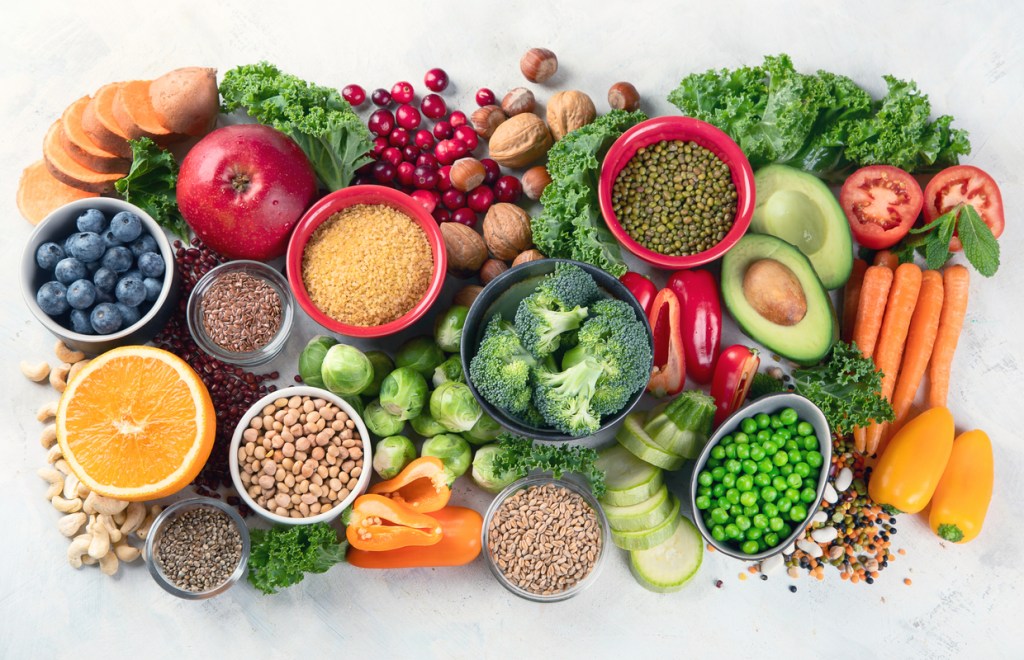Improving gut health with a low carb diet
Discover why following a diet lower in carbs could be the answer to great gut health...

Are carbs bad for your microbiome? New research is exploring the relationship between carbohydrates and gut health, and it turns out, a low carb diet could be the secret to improving your gut…
Did you know, microbes (with a few very rare exceptions) can only survive if fed with carbs? In contrast, animal cells run on fats AND carbs. This dual-fuel ability brings huge evolutionary benefits. For example, humans switch to carbohydrate burning in autumn to allow them to benefit from the carbohydrate bonanza of this natural harvest-time, which allows the laying down of fat.
This brought the survival benefits of insulation against cold winter weather and a pantry to turn to in lean times. Winter, spring and early summer diets on the other hand were fat- and fibre-based – in other words, ketogenic.
These days however, Westerners with modern food supplies live in a permanent autumn. We love this because carbohydrates are so addictive, but eating like this is also so dangerous.

Gut health and carbohydrates
The fact is that diets based on fat and fibre are unfriendly to invading microbes. This is in direct contrast to diets based on sugar and starch. Carbohydrates actively feed and encourage microbes, which can encourage infection and be detrimental to your gut health.
Diabetics are particularly susceptible to infection because of their high levels of blood sugar. Babies get oral thrush because this yeast (candida) happily ferments sugar in milk – even breast milk will be high in sugar if mum is eating a Western diet. Artificial Western bottle-feed is even sweeter.
Indeed, I suspect it is high-carb diets that, if not creating the problem, are surely contributing to antibiotic resistance. So read our tips below, to help you get the balance right.

5 steps to improving your gut health through a low carb diet
1. Fuel yourself with the right foods
When trying to improve your gut health, it’s important to predominantly fuel yourself with fat and fibre, not sugar and starch. This will allow you to nourish yourself while starving the harmful microbes, thus benefiting your gut health and overall wellbeing. You should also aim to eat two good meals a day and avoid snacking.
2. Make sure you’re getting your macronutrients
Be sure your diet is rich in micronutrients. We require additional micronutrients to compensate for the deficiencies induced by Western agriculture.
An essential part of this is ‘Sunshine salt’ – a type of salt that contains all the essential minerals, plus a good dose of vitamin D and vitamin B, and helps correct the deficiencies of Western foods. Combine this with a good daily multivitamin and you will have all the major micronutrients in your diet.
3. Use herbs and spices when cooking
Be sure your diet is rich in spices and herbs. All plants and fungi have survived millions of years of evolution using their own particular form of chemical warfare. They too fight an arms race against microbes. All plants and fungi contain natural antiviral, antibacterial, antifungal, antiparasitic and anti-worm toxins.
Happily, many taste wonderful – again, that is no surprise as the brain has learned to seek out foods that are good for our survival and it encourages us to eat them by giving us a
hugely pleasurable experience. I do not think it matters much which herbs and spices you eat so long as you eat a lot of them.
4. Avoid addictive foods and habits
To stay in control of your health, ensure your lifestyle is low in addictive potential. Western lifestyles are dangerously addictive – you can see many laid out when you stop to refuel your car: chocolate, sweets, crisps, cigarettes, caffeine, alcohol, gambling and sex magazines to name a few.
As any addict will tell you, one addiction tends to switch on another. I believe that sugar is more addictive than, and more dangerous than, smoking.

5. Eat plenty of high-fibre foods
Fibre is fermented by friendly, evolutionarily correct microbes in the lower gut into helpful by products such as heat, short-chain fatty acids (another fat fuel supply) and essential vitamins, such as vitamin K.
Friendly microbes train the immune system to respond and displace unfriendly microbes from the gut, increasing risks of infection. In turn, this aids in improving your gut health.
How will a low carb diet improve my gut health?
● The tips above inhibit upper gut fermentation – this further improves digestion and absorption of food and prevents leaky gut.
● Following this advice on what you eat will reduce the toxic load of Western diets in the gut, which has the potential to overload the liver.
Looking for more gut health advice? For IBS Awareness Month, we’re giving away free copies of Your Guide to Good Gut Health. Click here to find out more and download your copy.





